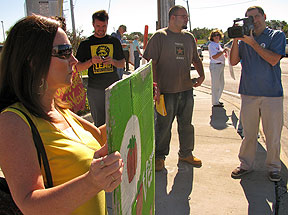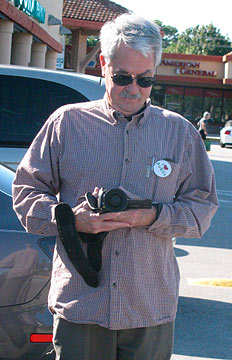|
Publix
|
vs. |
Publix
|
 Or, when a carefully-crafted public image goes horribly… |
|
Family = Love = Publix: For people who live within Publix’s southeastern US market, the image on the left will almost certainly be familiar. It is a screen photo from a commercial that airs seemingly non-stop in the run-up to Thanksgiving. The ad cuts back and forth among three fictional families, multiple generations gathered around their holiday tables, all listening in rapt attention to the Thanksgiving blessing, given in perfect pitch by two fathers and a grandmother who remind their loved ones how lucky they are to have each other.
The commercial, like other Publix ads, shows very little food, doesn’t show the store, and makes no mention at all of price or special discounts. Rather, with great economy it weaves a powerful, short narrative that follows this simple but remarkably effective formula:
Family = Love = Publix.
You can watch the commercial here. Go ahead, we’ll wait… and feel free to shed a tear or two. Anything that can touch that place deep, deep in our hearts where our love for family resides is worth letting in, if only for a moment. Just don’t forget to come back.
The other face of Publix: You back? Good. Now dry your eyes and take a good look at the man with the video camera above, on the right. He actually works for Publix (his white pin, in fact, reads “I *heart* Publix”). He is one of the team of videographers that Publix unleashed on farmworkers and Publix customers who support the farmworkers at pickets outside Publix stores. He is in fact the man who, under false pretenses, filmed farmworkers’ and customers’ families — including their children — during the very first Publix protests, until the resulting public uproar forced him and the other photographers to don their white pins and identify themselves as filming for Publix (“At Florida Tomato Protests, Backlash” 11/17/09, The Atlantic Monthly).
 He is the other face of Publix.
He is the other face of Publix.
He’s the face you see when you question why Publix continues to purchase tomatoes from growers tainted by last year’s brutal slavery prosecution.
He’s the face you see when you ask Publix to make good on its promise to be, in the words of its mission statement, “involved as responsible citizens in our communities.”
He’s the face you see when you protest Publix’s refusal to support tomato growers who today are implementing more ethical farm labor practices.
One recent story from the picket line captures the very different narrative behind this other face of Publix. About a week ago, CIW members and local allies organized a protest in Tampa. The picket attracted the attention of many in the Tampa rush hour traffic, including one kindergarten teacher who was so moved that she stopped to join in. As a teacher in nearby Ruskin, she has many students whose parents are farmworkers, and so she sees daily the struggles of farmworker parents to provide for their children. As she walked with the picketers, she talked with members of the CIW delegation and heard their stories.
After talking with the protesters, she approached a Publix representative who was on the scene. She voiced her concern for farmworkers as a Publix customer, but was met with a surprisingly harsh response. When the conversation was over and she told the Publix representative that she hoped she would meet him on better terms one day, his response was a curt “Don’t bother”. Taken aback with Publix’s hostility she quickly re-joined the protestors for the rest of the picket to spread the word to other customers in the evening traffic.
“Don’t bother”: Farmworkers who protest brutal conditions on the farms where Publix buys its tomatoes are met with silence from Publix executives and surveillance by Publix representatives. Publix customers who support the farmworkers are told not to bother to come back.
This is hardly the reaction one would expect from a company that puts so many millions of dollars into building its image as a caring member of the community, as a part of the family. But it is what it is: the harsh, defensive reaction of a multi-billion dollar corporation that responds to criticism as an attack, to a human rights crisis as a public relations crisis.
So this Thanksgiving, if you happen upon this commercial, try to reconcile the simple grace of the ad with the sheer inhumanity of Publix’s response, below, in today’s St. Augustine Record (“Farmworkers protest supermarket tomatoes”), because we can’t. When asked whether Publix continues to purchase from the farms where slave crews were recently found to have picked tomatoes:
“Publix spokesman Dwaine Stevens, who was on hand at the Cobblestone Plaza store to observe the protest, said the chain does purchase tomatoes from the two farms but pays a fair market price.
“Our position, and it remains firm, is it’s a labor issue,” Stevens said. “That’s not our role: to come between our suppliers and their workers.”
Have a great Thanksgiving, and see you in Lakeland on December 6th.

